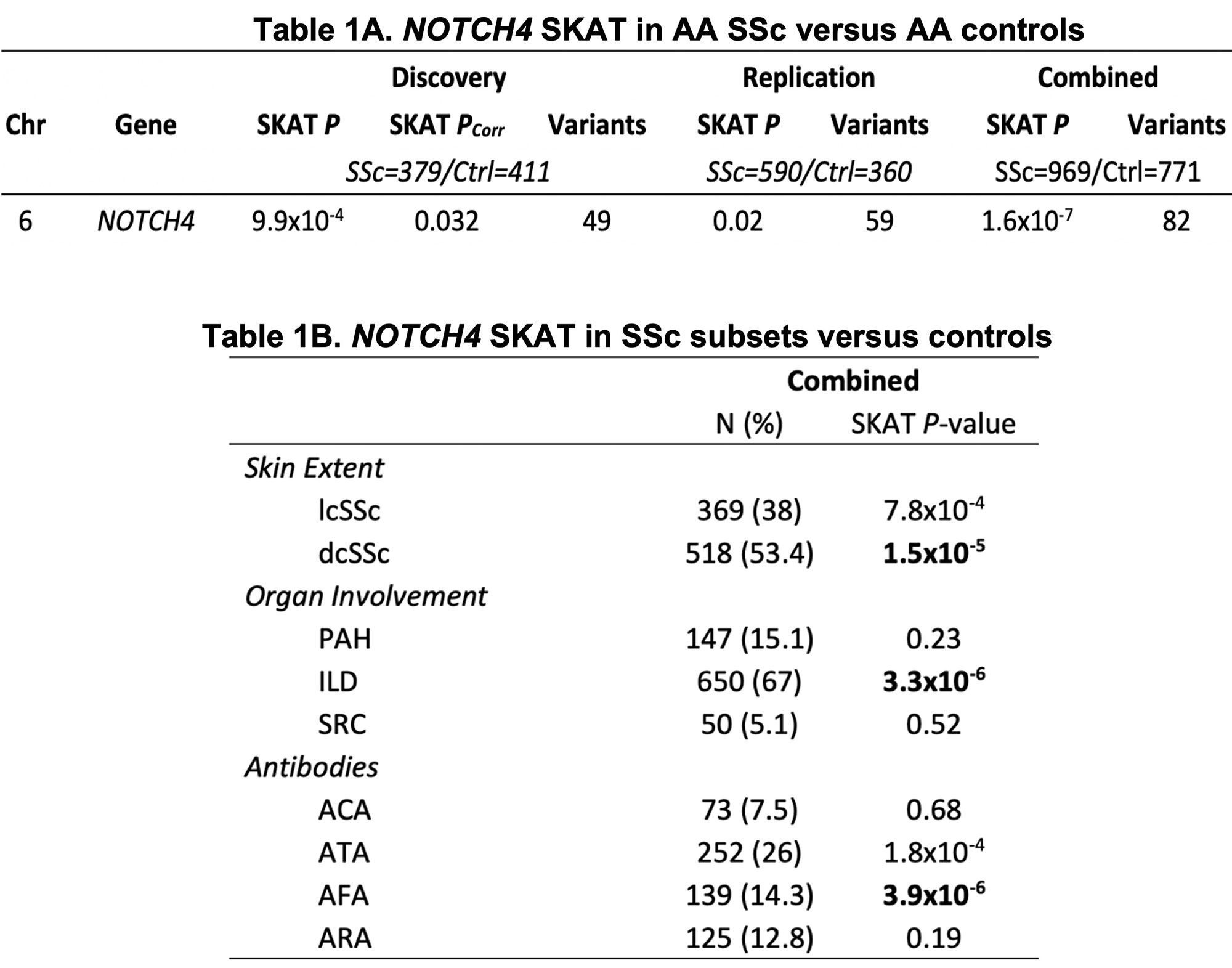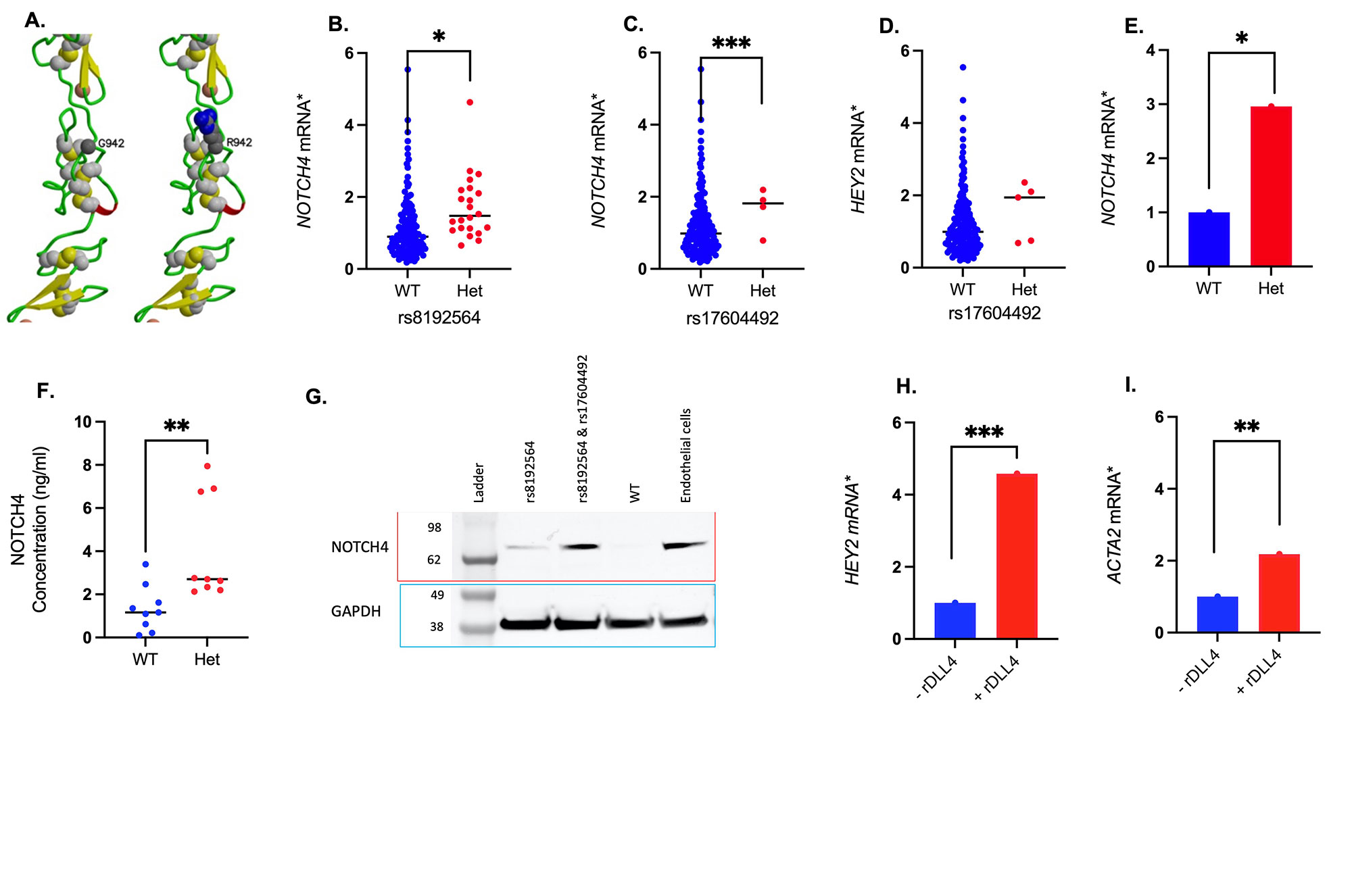Session Information
Session Type: Poster Session C
Session Time: 1:00PM-3:00PM
Background/Purpose: Genome wide association studies (GWAS) in systemic sclerosis (SSc) have identified several genetic loci, but the search for the causal variant and gene continues. In this study, using the Genome Research in African American Scleroderma Patients (GRASP) cohort, we evaluated previously reported genes from GWAS in SSc, primarily conducted in European ancestral populations. We further characterized the functional role of two variants in the Neurogenic Locus Notch Homolog Protein 4 (NOTCH4) gene.
Methods: We identified 32 genes associated with SSc susceptibility at p-value < 10-6 in the GWAS catalog. The gene-based sequence kernel association test (SKAT) test was used for association analysis and Bonferroni’s correction for multiple testing. Expression quantitative trait loci (eQTL) analysis was performed using the Genotype-Tissue Expression (GTEx) data. Lymphoblastoid cell lines (LCLs) from the 1000 Genomes Project that were wildtype (WT) and heterozygous (HET) for the rs8192564 (a 5′ UTR variant with CADD score >15) and rs17604492 (missense) were used to confirm the expression of NOTCH4 genes using RT-PCR and ELISA. Human lung microvascular endothelial cells (HULEC) were stimulated with NOTCH4 ligand-DLL4 to replicate increased signaling via this pathway.
Results: On comparing 379 AA SSc patients and 411 controls, only the NOTCH4 gene remained significant after multiple testing correction (Table 1A). This NOTCH4 association remained significant and was independent of the HLA variants, after conditional analysis. To validate these results, we examined an independent cohort of 590 patients and 360 controls and the NOTCH4 association remained significant. After multiple testing correction, diffuse cutaneous SSc, interstitial lung disease, and anti-fibrillarin antibody subsets remained statistically significant (Table 1B). eQTL analysis using GTEx data showed that both variants were associated with increased NOTCH4 expression in the HET LCLs and the rs17604492 variant also increased HEY2, (a downstream, nuclear signaling molecule for the Notch pathway) (Fig. 1B-D). Increased expression of NOTCH4 was confirmed in rs8192564 HET LCLs by RT-PCR (Fig. 1E). ELISA and western blot analysis using the lysates from LCLs confirmed the increased expression of NOTCH4 in LCLs carrying the risk alleles (Fig. 1F, G). Increased expression of the HEY2 and ACTA2 genes was observed on stimulating HULECs with DLL4 (Fig. 1 H, I). A previously published study has shown increased NOTCH4 expression in the skin of SSc patients (Fig. 2 A-D).
Conclusion: Functional variants in the NOTCH4 gene are associated with AA SSc patients and are independent of the HLA genes. Increased Notch signaling in endothelial cells can induce endothelial-to-mesenchymal transition and increased ACTA2 expression along with neoangiogenic circulation with sparse branching and dilated capillaries. SSc associated variants are associated with increased NOTCH4 expression and constitutively increase Notch4 signaling. Inhibitors of the gamma-secretase complex that cause cleavage of Notch intracellular domain have been shown to have a potent anti-fibrotic effect in different murine models of SSc and could be a potential therapeutic agent in SSc.
To cite this abstract in AMA style:
Kaundal U, Stenson E, Sahu M, Thakur K, Wang J, Shah A, Mayes M, Doumatey A, Bentley A, Shriner D, Domsic R, Medsger T, Ramos P, Silver R, Steen V, Varga J, Hsu V, Saketkoo L, Schiopu E, Khanna D, Gordon J, Criswell L, Gladue H, Derk C, Bernstein E, Bridges, Jr. S, Shanmugam V, Chung L, Kafaja S, Jan R, Trojanowski M, Goldberg A, Korman B, Mullikin J, Dell'Orso S, Adeyemo A, Rotimi C, Remmers E, Kastner D, Wigley F, Boin F, Gourh P. Functional NOTCH4 Variants Increase Notch Signaling and Susceptibility for Systemic Sclerosis [abstract]. Arthritis Rheumatol. 2022; 74 (suppl 9). https://acrabstracts.org/abstract/functional-notch4-variants-increase-notch-signaling-and-susceptibility-for-systemic-sclerosis/. Accessed .« Back to ACR Convergence 2022
ACR Meeting Abstracts - https://acrabstracts.org/abstract/functional-notch4-variants-increase-notch-signaling-and-susceptibility-for-systemic-sclerosis/



